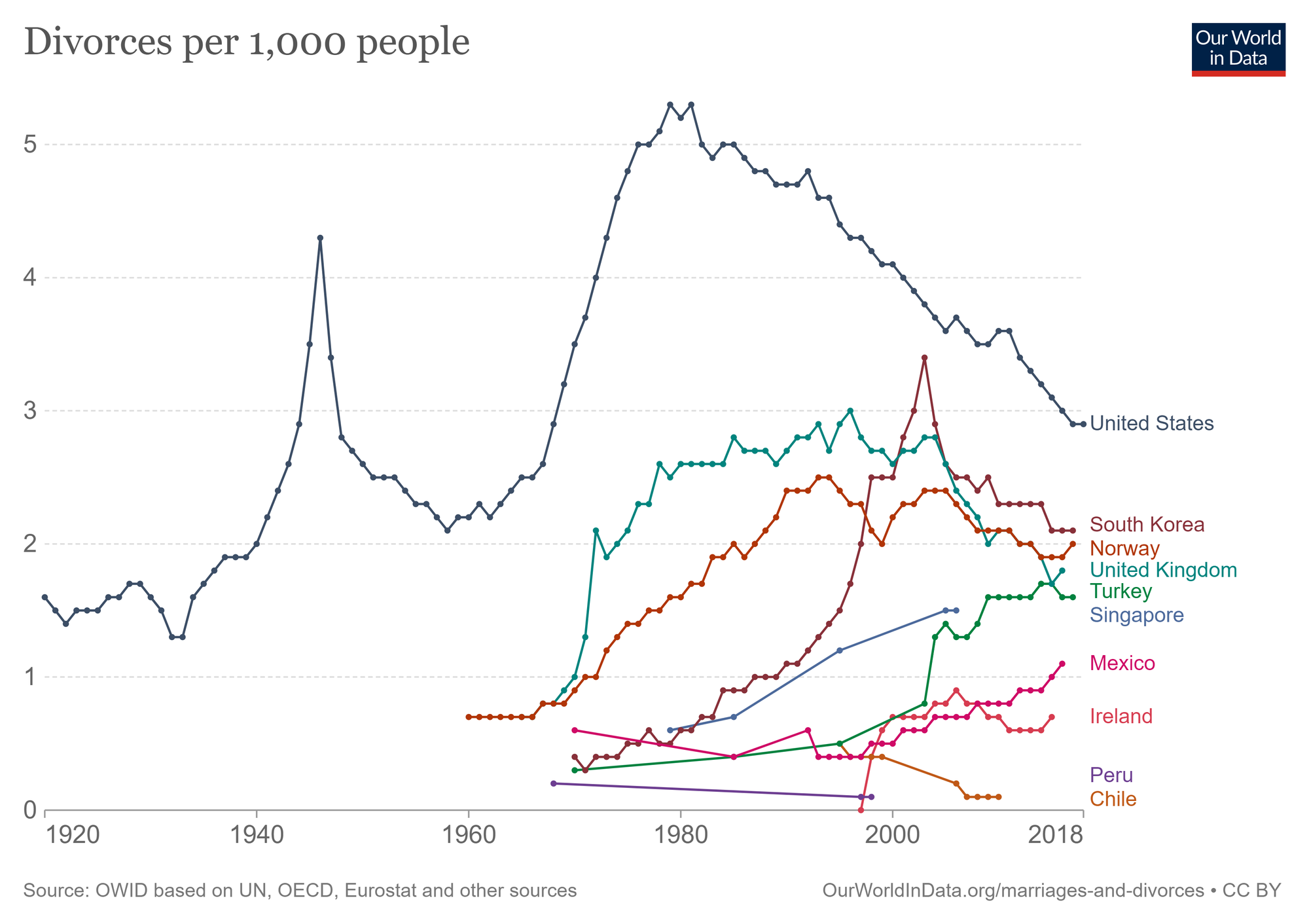Staying Power
It’s one of those myths that just won’t die.
For decades, we’ve heard the factoid that half of all marriages in America end in divorce. We’ve heard it so long, it must be true. Right?
Just this year, here it was in an article in January and another one in July. And similar factoids—usually without a citation—were prominent in articles this summer predicting a “Gray Divorce” explosion in the wake of the breakups between Bill & Melinda Gates and Jeff and McKenzie Bezos.
Except it isn’t really true. And lately, it’s getting been getting less true year by year. In fact, the U.S. hit a 50-year low for the divorce rate in 2019—and some survey evidence suggests the rate fell further during the pandemic. Some experts predict there will be a pent-up demand for divorces after the pandemic ends, but if so, it’s not clear it will reverse the decades-long downward trend over the long term.
In the U.S. and in most other developed countries around the world, divorces have been falling since the 1990s. They remain higher than, say, the 1960s or earlier. The U.S. rate is roughly double what it was a century ago. But things are moving in a better direction.

This should be good news for Christians who have a strong view of marriage. God joined Adam and Eve together as husband and wife in the Garden of Eden (Gen. 2:25) because “it was not good that the man should be alone” (Gen. 2:18). In some translations of the Bible, God Himself says He hates divorce (Mal. 2:16). And Jesus said of a man and his wife, “What therefore God has joined together, let not man separate” (Mark 10:9) and that any man or woman who divorce his or her spouse “commits adultery” (Mark 10:11-12).
It’s also good news for non-Christians. Marriage, while it forces us to shift our focus from serving ourselves to serving our spouse and kids, brings a plethora of health, financial and emotional benefits to husbands and wives. Children have also been shown to thrive best when raised by two parents who remain married to each other.
This is my seventh post in a series on positive cultural trends. (Here are the first, second, third, fourth, fifth and sixth posts in this series.) My purpose with this series is to cheer up my fellow Christians, too many of whom have become overly pessimistic in recent years, and to remind all of us that Jesus the King is still acting within our cultures to bless us and glorify Him.
It is true that divorce rates spiked in the U.S. following the enactment of no-fault divorce laws in the late-1960s and early-1970s. As you can see in the chart below, among people who married in the 1970s, 48% were divorced after 25 years. That’s one probable source for the “half of all marriages end in divorce” factoid. But as you can see, people who married in the 1980s were less likely to divorce than those who tied the knot in the 1970s, and people who married in the 1990s have divorced even less. The U.S. isn’t back to the levels of the 1950s and 1960s, but the trend is encouraging.

Of course, the story isn’t all positive. One reason for the declining divorce rate is a declining marriage rate. As you can see below, the U.S. marriage rate just hit an all-time low in 2019.

There is a distinct class dynamic driving this trend. College-educated and higher-income Americans are more likely to marry and stay married, but working-class and poor Americans see higher levels of singleness. For Americans in the top third income bracket, 64% are in an intact marriage, meaning they have only married once and are still in their first marriage. In contrast, only 24% of Americans in the lower-third income bracket are in an intact marriage, according to an analysisof the 2018 Census data by the Institute for Family Studies.
In response to this trend, many social scientists and policy experts have promoted marriage a key way to address many of the social and economic challenges facing the U.S. and other countries. Christians can and should join in these efforts.
Meanwhile, we can also take some comfort knowing that more people who get married are staying together. Our families and societies are certainly better for it.
